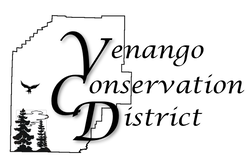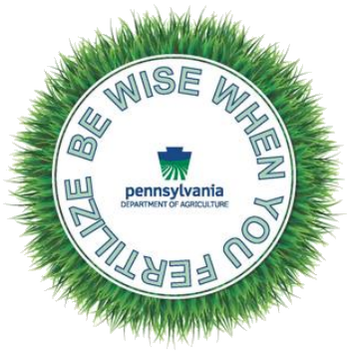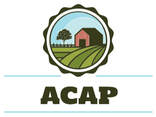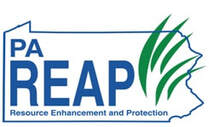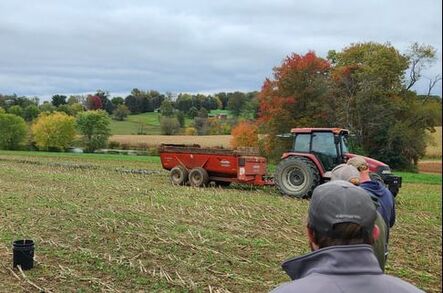Our Agricultural Conservation TechnicianThe goals of our Agricultural Conservation Technician are to assist farmers in Venango County with agriculture conservation activities including technical assistance related to the administration of the Nutrient Management Law (Act 38) and Manure Management (Chapter 91), as well as assisting with funding procurement for implementing Best Management Practices (BMPs) on farms to minimize nonpoint source pollution. Additionally, education and outreach related to agriculture conservation are also performed. For questions or to request technical assistance, please contact: Jane Burkett Agriculture Conservation Technician (814) 676-2832 ext. 4 [email protected] |
Agricultural Conservation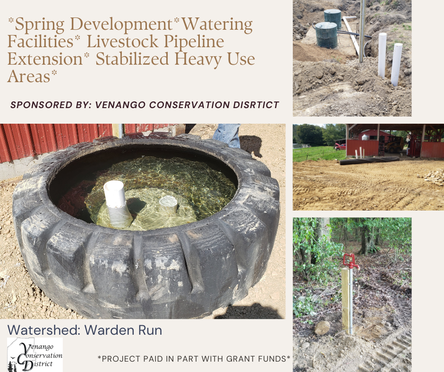
About 12% of the land use in Venango County is used for agriculture, according to USDA's 2017 agriculture census. The county is home to over 400 farms across 53,000 acres of land.
The Venango Conservation District is here to support a variety of different farming operations in conserving natural resources, as well as assist in improving efficiency and production on farms throughout the county. We can assist owners and operators with manure and nutrient management plans, provide technical assistance related to funding agricultural Best Management Practices (BMPs), and help find solutions to natural resource concerns. Agricultural Best Management Practices are measures that producers can take to help reduce the amount of fertilizers, pesticides, animal waste, sediment, and other environmental pollutants from entering surface and ground water sources. Examples of BMPs include but are not limited to: cover crops, Animal Heavy Use Areas (AHUA), manure storage systems, streambank stabilization, streambank fencing, off-stream watering facilities, and much more. If you have questions or would like more information about the services we can offer you, please contact our Agriculture Conservation Technician. |
Manure ManagementEvery farm in Pennsylvania that land applies manure or agricultural process wastewater (generated on the farm or received from an importer), regardless of size, is required to have and implement a written Manure Management Plan. This includes manure and agricultural process wastewater application by various types of equipment and/or direct application of manure by animals on pastures and in Animal Concentration Areas (ACAs). In other words, farms that do not mechanically apply manure but do have pastures or ACAs still need a Manure Management Plan.
Farms defined as Concentrated Animal Feeding Operations (CAFOs) and Concentrated Animal Operations (CAOs) are required to develop written plans as well. The nutrient management plans for these animal operations are required to follow a different more detailed process and must be developed by a Certified Nutrient Management Specialist (see below). Nutrient ManagementThe basic concept of nutrient management is to balance the nutrient application to crop fields (typically nitrogen, phosphorus, and potassium), whether from spreading manure or chemical fertilizers, with the amount necessary for optimum crop growth and production. If this balance is achieved, there is a two-fold benefit:
The goal of the program is to encourage farmers to develop Nutrient Management Plans for their operations, and provide assistance to those who wish to participate. In some cases across the state, farms are considered Concentrated Animal Operations (CAO's) or those operations that have an animal density that exceeds two animal equivalency units (AEU) per spreadable acre (i.e. cropland, hayland, pasture). An AEU is 1000 pounds of live weight of any animal. CAO's are required by law to develop and maintain a nutrient management plan. Most farms are considered volunteer operations that wish to balance nutrient applications. |
What Plan is Right For You?
All animal operations in Pennsylvania that generate or land apply manure, regardless of scale, are required to have one of two types of plans:
Click the button below to view a flowchart to help you determine the right plan for you If your operation involves a large quantity of animals, it could be a Concentrated Animal Feeding Operation. Follow this link “Is My Operation a CAFO” to see if it meets the requirements. Is your farm a Concentrated Animal Operation? Complete this worksheet to find out. Contact our Agriculture Conservation Technician for assistance related to these plans. |
|
Urban Nutrient Management: PA Fertilizer Law Information
In July 2022, Pennsylvania adopted a new fertilizer law designed to minimize the movement of nutrients into our waterways. According to Department of Conservation and Natural Resources (DCNR), Pennsylvania now contains over 2 million acres of lawn. Everyone who manufactures, guarantees, or applies fertilizer is required to follow the Pennsylvania Fertilizer Law and Regulations. This includes lawn care providers and homeowners/residents who self-apply fertilizer. When looking to apply nutrients to your lawn, make sure you are aware of what your lawn needs and what the Pennsylvania Fertilizer Law allows. To determine your lawn’s nutrient needs, it is best to first soil test. Soil tests provide specific recommendations for nitrogen, phosphate, and potassium. Following the soil test recommendations ensures that you are applying only what your lawn needs, thus reducing nutrient loss and fertilizer cost. Contact our Agriculture Conservation Technician for assistance with soil testing. Use the following links for more information about the PA Fertilizer Law: |
Funding Resources
Are you a part of an agriculture operation in Venango County? Do you wish to improve efficiency and natural resource concerns on your farm? Then these funding opportunities may be a fit for you. If you would like to apply for any of these programs, please contact our office for assistance.
Read this article for more funding opportunities related to agriculture conservation practices.
Read this article for more funding opportunities related to agriculture conservation practices.
Nutrient Management Grants
The VCD coordinates two grant programs to help agriculture producers participate in the nutrient management program.
- The Plan Development Incentives Program (PDIP) is an opportunity for cost-share funding to aid a farmer in developing a nutrient management plan.
- The second is the Nutrient Management Plan Implementation Grant Program (NMPIGP), which is an opportunity for cost-share funding to aid a farmer in completing on-the-ground practices recommended in their nutrient management plan.
Technical Assistance Resources |
Our Agriculture Conservation Technician can give you assistance with the activities mentioned below. Please reach out if you have any questions or would like to schedule an appointment.
|
-
Soil Testing
-
Manure Spreader Calibration
<
>
|
Soil Testing Available!
Testing your soil allows you to understand changes in nutrient content in order to be more efficient and save money on fertilizer, lime, and manure applications. Our Agriculture Technician can assist Venango County farmers with soil testing. After assisting you with collecting samples, the soil is sent to Penn State for testing, and you will receive a report detailing the results and recommendations for nutrient amendments. |
|
Assistance with Manure Spreader Calibration
Manure spreader calibration is an essential and valuable nutrient management tool for maximizing the efficient use of available manure nutrients. Planned manure application rates listed in nutrient management plans must correlate with actual application rates. Calibrating the manure spreader is the only way to know actual manure application rates. Manure spreader calibration combined with soil test recommendations and manure analysis results enable the determination of nutrient application rates that meet crop nutrient needs Why calibrate?
|
